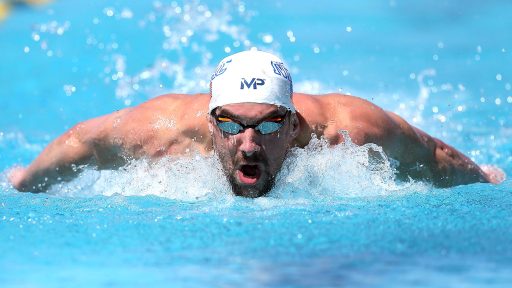
The 'craziest' thing Michael Phelps did to become the greatest swimmer of all time

People love to have debates about who's the greatest of all time in any given sport; maybe it's because you don't even have to be an expert to get in on them. All you need to know is the yardstick for success. Serena Williams or Steffi Graf? Tom Brady or Joe Montana?
That's what makes Michael Phelps special. There's no debate. He's the greatest swimmer and most decorated Olympian of all time: 28 medals won over four different Olympic Games, 23 of them gold.
The question is, how?
It turns out, Phelps worked hard on his craft. He also does a few mental exercises that the rest of us would do well to emulate. Fortt Knox sat down with him to get some of his best insights. Here's a sampling:
Watch Your Language
Visualization was an important part of Phelps's training; he would literally picture himself doing races the way he wanted. That, combined with a grueling training regimen that saw him spending hours in the pool seven days a week, allowed him to fine-tune his technique even on dry land. A less-discussed aspect of his mental approach: His coach had him use language to shape his ambition.
"One of the craziest things my coach tried to get me, when we first started to train together, not to say the word 'can't.' So that I could broaden my mind and believe that I could do whatever I wanted to. And I think that was a key of us being so successful."
Convert Trash to Fuel
Some athletes are masters of trash-talk: getting inside an opponent's head with an insult or boast (See: Muhammad Ali). Phelps was not.
"I'm staying in my lane. I'm doing what I have to do —what I want to do —to be able to try to be the best," he said.
"For me, at the end of the day, when I was training, it was like, as long as I figured out what I needed to do in order to accomplish my goals and dreams, that's all that mattered. Nothing else mattered. Everything else would just play out. I can't control what other people do," the record breaking Olympian said. "So for me, I was always worried about myself, and what I needed to do. And it worked."
He did, however, love it when his opponents talked trash. It riled him up and motivated him to perform at his best. Combined with his visualization and focused language, this seems to have had a profound effect: He enhanced the effectiveness of his positive effort by replaying it in his head, and reduced the potential impact of fear by limiting the language that triggered it. On top of all that, he developed the skill of turning nay-sayers into cheerleaders. That made him really hard to throw off his game once he dove into the water.
Bounce Back
Once the competition was over? That's another story. Phelps had well-documented struggles with discipline outside of the pool, including a couple of driving under the influence (DUIs) and a photo of him with a bong.
He's now able to reflect on the depths of the depression that led him to those moments, and the focus that helped him to climb out. After more than a decade of mastering the mind of Phelps the swimmer, he finally began to consider the mentality of Phelps the man.
"I'll be the first one to admit a mistake when it's made. It's the only way you're able to move on and learn from that mistake. By no means has my life been absolutely perfect," he said.
"I think I've seen the darkest of the dark, and there are days when I didn't want to be here. But being able to come out of the other side, and just to work and learn things about me that I never knew or I didn't want to know at that point, I think it changed my life."
CNBC
 Varchev Traders
Varchev Traders Read more:
If you think, we can improve that section,
please comment. Your oppinion is imortant for us.











